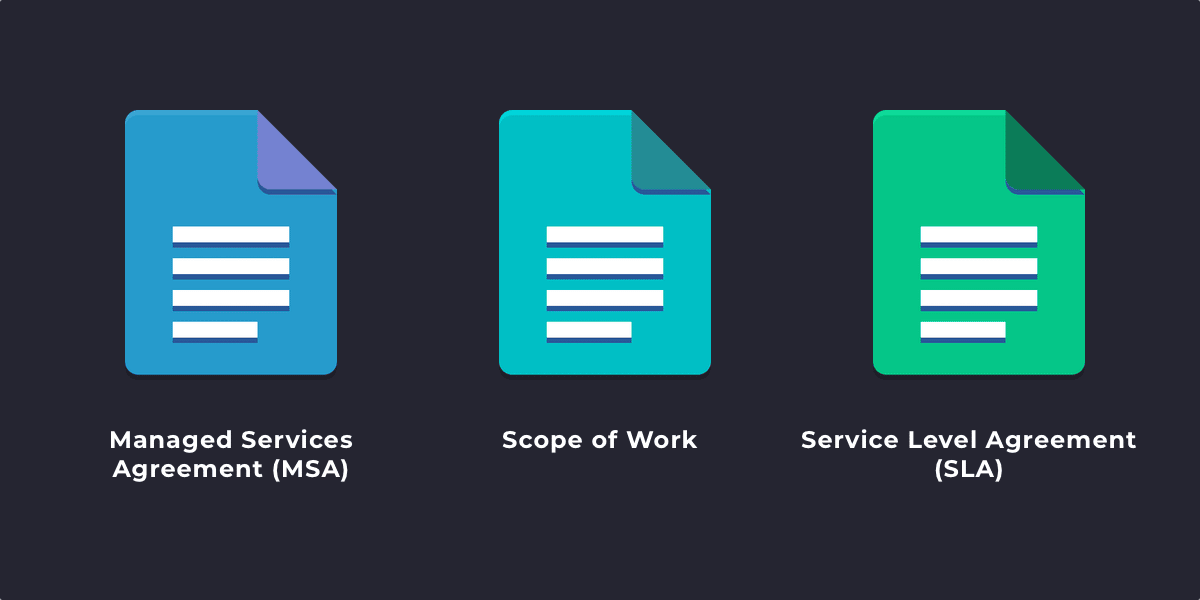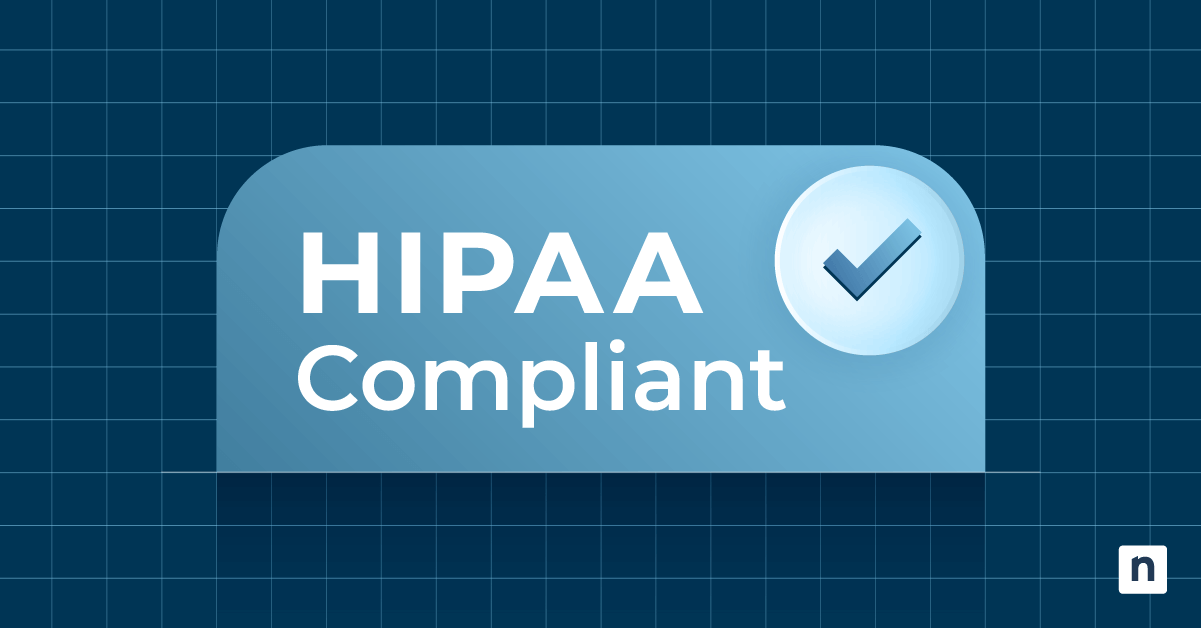Key Points
- A Managed Services Agreement (MSA) is a formal contract outlining your MSP’s services, payment terms, response times, and liabilities.
- It differs from a Master Service Agreement, which provides a general framework for future deals.
- A statement of work (SOW) is used for project-based work, detailing deliverables, timelines, and pricing.
- An SLA (service-level agreement) sets service expectations like response times and network downtime guarantees, often included within an MSA.
- Clearly define payment clauses and termination clauses to protect your MSP and ensure both parties know how to “settle up.”
- Include response time commitments, force majeure language (for uncontrollable events), and remote access stipulations to clarify responsibilities.
- Review and update your MSA regularly (annually is common) to keep up with changes in offerings and business needs.
- Use auto-renewing contracts, an annual price-increase clause, and a three-year term to stabilize revenue and showcase long-term value.
Wouldn’t it be great if all business transactions could be conducted over lunch and executed with a handshake? It would sure cut down on the paperwork.
Unfortunately, business is far too complicated for the kind of vagueness and misunderstanding that would arise from such a deal. Everything needs to be in writing. Love them or hate them, those piles of paperwork are your allies.
This is especially true when evolving your business from a break/fix model to managed services. With long-term business relationships in your sights, there are a lot of expectations to be managed on either side of the bargaining table. MSP contracts and agreements keep both sides of the relationship honest and set expectations for the future of the relationship.
This begs the question – are you one of the 75% of service providers who are still doing a la carte services and break/fix?
If so, you probably have designs on adding or expanding your managed services offerings and capturing more recurring revenue either soon or down the road. If this is the case, your managed services agreement (MSA) is going to be your most important tool for making the transformation.
With that said, let’s take a closer look at the specifics of MSAs, how they’re written, and how they differ from other documentation that you might use in your MSP.

What is a managed services agreement (MSA)?
In the IT channel, the abbreviation “MSA” almost always refers to a Managed Services Agreement.
An MSA (which can also be called a managed services contract, or a management service agreement) is an agreement between a managed services provider (MSP) and a client. The contract defines which services the MSP will provide, the minimum amount of time for a response, payment structure, and liability protection.
A Managed Services Agreement provides a framework under which you can organize, define, and present your service offering to clients. By defining your offering within a Managed Services Agreement you create a structure that gives MSPs a repeatable way to scale their business while increasing profitability.
Managed services agreement vs. master services agreement
This is very different from a Master Service Agreement, which serves as a framework for future agreements or transactions. Think of it as serving almost as a “template” for future dealings by providing common provisions and terms that extend to all business done between the two entities.
How is a managed services agreement different from a scope of work or statement of work?
A statement of work (SOW) is usually presented when project work is involved. It describes a project’s work requirement, defines project-specific tasks, sets deliverables and timelines, and pricing. A Scope of Work or Statement of Work is often presented with a managed services contract when some sort of fixed, project-based work is involved.
- A Scope of Work or Statement of Work is associated with project work, whereas the MSA is associated with long-term relationships that generate recurring revenue.
- You can use a SOW as a response to a project RFP, or as a lead-in to a proposal.
- A SOW is often turned into an agreement after the client approves it.
What is a service level agreement (SLA)?
A service level agreement (SLA) is an MSP contract that in many ways sets the tone of the relationship between vendor and client. The SLA establishes a set of deliverables and delivery parameters that one party has agreed to provide another.
SLAs vary depending on how and where they’re used, but a few MSP SLA examples include response times based on the severity of events, network downtime guarantees, and compliance considerations.
It is common for Managed Services Agreements to contain an SLA within them or equivalent contractual language that establishes the specifics of the service portion of the contract.
Some MSPs do use the term Service Level Agreement in place of Managed Services Agreement when titling or referring to their contract with their clients for services.
Why does an MSP need a managed services agreement?
First and foremost, an MSP must clearly define its offering in a written format. The MSA allows you to describe your solution stack, define the working parts of your relationship, set expectations in terms of satisfying the client’s requirements, and document the legal protections for both yourself and your client.
A well-written MSP contract also makes your life easier by giving you more control over when you will get paid, when contracts need to be renegotiated, and how renewals are handled. It also sets standards for your relationship which can help if any disputes ever arise.
What should my managed services agreement include, and how do I write an MSP MSA?
Many up-and-coming IT service providers are in the dark about how to write an MSA.
You can certainly write one from scratch but using a guide or boilerplate like our free MSA template will make things much easier. Our managed services agreement template is based on the MSA we used successfully for years at our MSP. A lot of trial and error went into its development, but ultimately this document was the key to turning the business from a break-fix to a managed services model with a repeatable and scalable way to do business with a diverse clientele.
Your standard MSA should cover the most important aspects of the relationship between your MSP and your client. This includes how and when you get paid, work policies, renewals, and what happens if there’s a need to end the relationship in the future.
You should also think of your MSA as a potential sales tool. You’ll notice the cover sheet of our managed services agreement pdf includes a checklist of services and products offered that you can use to reinforce the value you’re providing to a client before asking them to sign on the dotted line. Before even digging into the agreement the client has a clear understanding of what they get under the agreement.
| Managed Service Offerings | Titanium |
|---|---|
| Unlimited On-site and Remote Support | ✔️ |
| Unlimited Automated Support | ✔️ |
| PC Monitoring, Maintenance, Patching | ✔️ |
| Office 365 | ✔️ |
| Cloud File Sync & Share | ✔️ |
| Endpoint Protection / Antivirus | ✔️ |
| Security Threat Detection and Remediation | ✔️ |
| Security Awareness Training | ✔️ |
| Cloud Backup | ✔️ |
| Backup Disaster Recovery Appliance | ✔️ |
| Monthly Reporting | ✔️ |
| Virtual CIO | ✔️ |
| $ |
Sample managed services agreement clauses that you should include
Whether you use our template or build your own, your managed services contract should include:
Payment clause
Set your terms to require payment in advance. You’ll be glad you did when you don’t have to spend time and money chasing down payments.
MSPs need to make it clear that they are an essential component of their client’s operations and must be paid on time and in full unless there have been negotiated changes in payment terms previously agreed upon. Below is an example of contract language related to a client’s failure to pay that can be included in a managed service agreement:
Failure to pay: If payment is not received by the first of the month for that month of service MSP reserves the right to put a hold on rendering on-site and remote services until the monthly fee has been paid, provided MSP gives a five (5) business day notice of late payment.
If Client fails to make payment for any services or items purchased, and such failure continues for fifteen (15) days, interest shall accrue on any amount due at the rate of 12% per annum until paid. In the event collection processes are instituted to collect any amounts due from Client, Client shall pay the costs of collection plus reasonable attorney fees.
Termination clause
Determines what will happen if you or your client decides to end the business relationship. (This can be extremely important for you if you ever need to cut loose from a problem client.) Realistically, you probably aren’t going to take a client to court to keep them in a contract they don’t want to be in, but you need to define how a client would “settle up” and pay you before they’re able to walk away.
Response time clause
Define the scope of service that’s included, as well as the cost of additional service, projects, and onsite visits.
Managed Services Response Times
| Trouble | Priority | Response Time 9 am – 5:30 pm Weekdays | Response Time 5:30 pm – 9 am Weekdays/Holidays |
|---|---|---|---|
| Service not available (all users and functions unavailable. Ex: Server down) * | 1 | Remote within 1 hour On-Site within 3 hours | Remote within 2 hours On-Site within 4 hours |
| Significant degradation of service (large number of users or business critical functions affected) * | 2 | Remote within 2 hours On-Site within 4 hours | Remote within 2 hours On-Site within 4 hours |
| Limited degradation of service (limited number of users or functions affected, business process can continue) ** | 3 | Remote within 8 hours On-Site within 48 hours | Remote within 12 hours On-Site within 48 hours |
| Small service degradation (business process can continue, one user affected) ** | 4 | Remote within 24 hours On-Site within 72 hours | Remote within 24 hours On-Site within 72 hours |
Simplify the MSA creation process with this free managed services agreement template.
Force majeure clause
Ensuring that you are not held accountable for losses or damages that are beyond your control. The pandemic is a great example of how external forces beyond your control can quickly impact both your business and your clients. It is important that your managed service agreement take these potential changes into account and clearly define expectations of the business relationship during times of crisis, including what clients should expect. These terms will also define how your MSP is protected.
Below are examples of contractual language that can be used in a managed service agreement. In drafting these clauses, I sat down with an attorney to make sure they were the right language for the present time as well as the future. These clauses or variations of them should be part of any managed service agreement. The contractual language in these clauses is meant to provide adequate coverage for your clients, taking into account situations outside of the control of your MSP while ensuring protection for all parties.
MSP MSA contractual language example
Neither party shall be liable for any failure of or delay in the performance of its obligations under this Agreement to the extent such failure or delay is due to circumstances beyond its reasonable control, including, without limitation, acts of God, acts of a public enemy, pandemics, fires, floods, wars, civil disturbances, sabotage, accidents, insurrections, terrorism, blockades, embargoes, storms, explosions, labor disputes (whether or not the employees’ demands are reasonable and within the party’s power to satisfy), acts of any governmental body, failure or delay of third parties or governmental bodies from whom approvals, authorizations, licenses, franchises or permits must be obtained, or inability to obtain labor, materials, equipment, or transportation or illness of MSP’s technical staff (collectively referred to herein as “Force Majeure”). Each party shall use reasonable efforts to minimize the duration and consequences of any failure of or delay in performance resulting from a Force Majeure event.
Remote access clause
Make it clear that there are potential security and cost considerations that may come into play if MSP or client employees are forced to work from home. This is another clause that should be of obvious value in 2025.
For more information about these clauses, check out the Sample Addendum Language for Updating Your MSA section of this article on Channel E2E.
How often should I revise my MSP managed services agreement?
There are many different takes on this question.
If your agreement has fallen behind your offerings or business needs in terms of service offerings to clients, contract language, and payment terms, then now is the time to update it. The draft language included in this post gives MSPs added protections and the ability to be pre-emptive when a client requests changes to service or billing all the while ensuring their business is protected.
You certainly don’t want a bunch of different agreements floating around such that you’re never sure which clients are under which provisions. A yearly review of your documentation is usually sufficient. Focus mainly on finding and changing any clauses that create problems for you or that don’t benefit your business relationships. The following bullet points are clauses that you might want to work into your next revision.
Other MSA tips and hacks
- Your managed services contract should be auto-renewing to help protect your revenue streams and reduce the burden of negotiating renewals. This is also critically important if you ever plan on selling the business.
- Include an annual price increase clause. Such a clause protects you from increasing costs over the course of the contract due to inflation or vendor price increases. With that, this MSP pricing calculator can help you track and plan expenses to make sure your MSP contract is profitable.
- The ideal duration of a managed services contract is three years. From a valuation perspective, this is an easier sell, allows you to lock in your terms, and prevents you from having to renegotiate all your contracts every year.
- Don’t think of any of these documents as a way to “lock” clients into doing business with you. By and large, the MSA is a way to define your offering, manage expectations, and keep both parties happy throughout the relationship.
- Protect your business from the headaches that old equipment can bring! Include language in this vein to minimize problems with outdated hardware or software: At the time of initiating service for Client, MSP will evaluate Client’s network and determine whether all Managed Services Requirements are in place and if not in place will install the required services. Charges for bringing the network into compliance with the requirements will be billed as incurred as additional services. This Agreement covers users and their associated computers and other devices as detailed in the appendix. Client shall provide a desktop and laptop that are less than 5 years old and in good functioning condition to serve as a hot spare. A hot spare will not be counted as an operating computer for purposes of this Agreement.
Your Managed Services Agreement could be considered the most important document in your business, so make sure you’re giving it due consideration. Even if you already have an MSP contract, feel free to check out our template and compare notes.

![Managed Services Agreements for MSPs [Including Template & Examples] Managed Services Agreement Blog Banner](https://mlfk3cv5yvnx.i.optimole.com/cb:HA53.300ea/w:930/h:465/q:mauto/f:best/https://www.ninjaone.com/wp-content/uploads/elementor/thumbs/managed-services-agreement-what-to-include-qvjtaupmg3of6wnktnyvy3q3s36by67es6tdpxmcoa.png)







